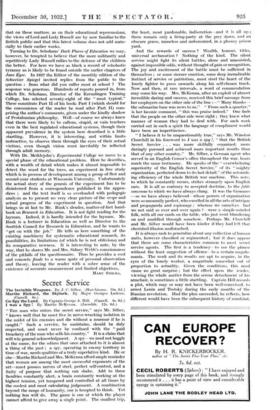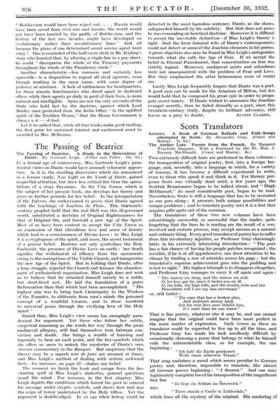Secret Service
" THE man who enters the secret service," says Mr. Silber, " knows well that he must live in nerve-wracking isolation in the midst of his enemies and die without a murmur if he is caught." Such a service, he maintains, should be duly respected, and must never be confused with the " paid treachery of the man who sells his country." It is a claim that will win general acknowledgment. A spy—we need not boggle at the name, for the odium that once attached to it is almost a thing of the past ; a spy, operating in enemy territory in time of war, needs qualities of a truly superlative kind. He or she—Marthe Richard and Mrs. McKenna afford ample reminder that women are among the most successful exponents of the art—must possess nerves of steel, perfect self-control, and a fixity of purpose that nothing can shake. Add to these faculties constantly alert, a brain constantly working at the highest tension, yet tempered and controlled at all times by the coolest and most calculating judgement. A combination beyond the range of humanity, one is tempted to think. Yet nothing less will 'do. The game is one at which the player cannot afford to give away a single point. The smallest trip, the least, most pardonable, indiscretion—and it is all up ; there remain only a firing-party at the prey dawn, and an obscure grave, nameless and unhonotired, in a gloomy prison yard.
And the rewards of success ? Wealth, honour, titles, universal acclamation ? Nothing of the kind. The silent service might fight its silent battles, alone and unassisted; against impossible odds, without thought of gain or recognition. The joy and excitement of the battle must be sufficient in. themselves ; or some sterner emotion, some deep ineradicable. instinct of service or patriotism, must steel the heart of the lonely fighter to press onwards along his self-chosen track. Now and then, at rare intervals, a word of commendation may come his way. Mrs. McKenna, after an exploit 'of almost incredible daring and success, received this brief message from her employer; on the other side of the line :—" Many thanks— the submarine base was news to us." " From such a quarter," is her laconic comment, " this was praise indeed." One feels that the people on the other side were right ; they knew what manner of woman they had to deal with. For such work carried out in such a spirit the language of compliment would have been an impertinence.
" I believe it to be unquestionably true," says Mr. Winston Churchill in his foreword to I was a spy !, " that the British' Secret Service . . . was more skilfully organized, more daringly pursued and achieved more important results than that of any other country." Mr. Silber, a German agent who served in an English Censor's office throughout the war, bears much the same testimony. He speaks of the overwhelming superiority of the English Secret Service," of its " mighty organization, perfected down to its last detail," of the astonish- ing efficiency, of the whole British war machine. This note, to which he constantly recurs, strikes strangely upon English ears. It is all so contrary to accepted doctrine, to the fable convenue to which we have always clung. It was the Germans —so we have always believed—whose powers of organization were so uncannily perfect, who excelled in all the arts of intrigue and propaganda and espionage ; whereas we ourselves had we not said so over and over again ?—were a simple-minded folk, with all our cards on the table, who just went blundering on and muddled through somehow. Perhaps Mr. Churchill and Mr. Silber would have been kinder if they had left that cherished illusion undisturbed.
It is always rash to generalize about any collection of human units, however classified or regimented ; but it does appeal. that there are some characteristics common to most secret service agents. The first is a tendency—to use the phrase without the least suggestion of offence—to a certain megalo- mania. The work and its results arc apt to acquire, in the eyes of the lonely worker, a magnitude somewhat out of proportion to actuality. Given the conditions, this need cause no great surprise ; but the effect upon the reader, viewing the whole matter from the serene detachment of his armchair, is sometimes a -little startling. Captain Hill records a plot, which may or may not have been well-conceived, to arrest Lenin and Trotsky during the early months of the Russian revolution. Had the plan succeeded, he reflects, how different would have been the subsequent history of mankind. " Bolshevism would have been wiped out. . . . Russia would have been saved from civil war and famine, the world would not have been harried by the gadfly of Bolshevism, and the history of the last two decades might have developed on evolutionary rather than revolutionary lines." And all because the plans of one determined secret service agent went awry One is reminded of the half-caste clerk in Mr. Kipling's story who boasted that, by altering a single line in a pay-sheet, he could " disorganize the whole of the Treasury payments throughout the whole of the Presidency circle." • - . Another characteristic—less common and certainly less agreeable—is a disposition to regard all rival agencies, even though working in the same cause, with some degree of jealousy or mistrust. A lack of enthusiasm for headquarters, for those remote functionaries who dwell apart in sheltered offices while their agents go daily in peril of their lives, is more natural and intelligible. • Spies are not the only servants of the State who hold fast by the doctrine, against which Lord Morley once protested from the India Office " in the uplifted spirit of the Trodden Worm," that the Home Government is always a d—d fool.
Let it be added that, while all four books make good reading, the first prize for sustained interest and excitement must be awarded to Mrs. McKenna.































 Previous page
Previous page